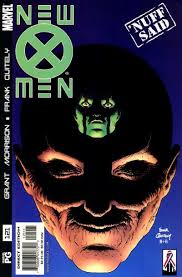Geoff Johns, Richard Donner, and Adam Kubert on Action Comics 846. I like Zod, but this book is only pretty good. It strikes me mostly as a response to the new Superman film, a kind of "This is the movie I would have done if you had ditched that Bryan Singer clown." I may keep up with it, but I have not decided.
Bryan K. Vaughan and Adrian Alphona's Runaways 24. The run by the book's creators ends here. All my mixed feeling about the book are prompted by this issue -- it is nice, and the stories are pretty good, and the art is often great, but the dialogue and exposition are often clunky and it also has a random quality that bothers me. There is a twist here about a main character -- I won't spoil it -- but the surprise is just sort of out of nowhere: it is not what you expect because it is not what you expect if that makes sense, and that is all there is to it.
I was thinking this week how I am getting too many mediocre books and I need to clean house -- I get these books because there are not enough good comics. Also people have been making me feel bad about Chris Claremont. So I found the solution to both with one thing: I bought the DVD-rom of 40 years worth of X-Men comics for 40 bucks. Now I will go back and read Claremont again in color and think about how he relates to Morrison, and what a genius he used to be, instead of buying books I don't like that much.
In comics news: Whedon will only do 6 -- yes 6 -- issue of Runaways. So there you have it. Sad, but the guy has stuff to do and I am sure the 6 will be perfect.
Also in comics news: Neil Adams announced at the comic con that he going to do an eight part project with Frank Miller called Batman: Odyssey. Check out the weirdness. Miller owns Batman. Morrison makes fun of Miller and says he wants his Batman to get away from Miller's psycho and back to the Neil Adams love god days. You know Morrison is freaking out about Miller because his Batman run starts with a cop who dresses as Batman and kills: as Mitch (I think it was) pointed out this character is from the comics, the two issues before Batman: Year One came out; it is like Morrison is wishing he could have taken over before Miller did his thing. Morrison wants Neil Adams style; Miller responds by getting the actual Neil Adams. And people tell me this anxiety of influence thing is just a nutty theory.
One more thing: I don't have much to say about the con, but what I do have to say I said to comic geek speak. Go to the site (link on the right) and listen to episode 229 (28 February 2007): my bit is 8 minutes long, involves me talking about strip clubs and ranting about Planet Hulk, and starts at the 27:30 mark. Library Boy (Demon Etrigan) had this to say about me on the CGS forum:
I'm only as far as the Geoff Klock interview at the moment, but I just need to
say that I agree with the man 100% about the event book glut, and that it's also
driving me to the fringes of the Big 2 publishing lines just so I can get good
stories that don't tie into this crap. Where do I get my "Geoff Klock was right"
or "Geoff Klock is my master now" t-shirt?







